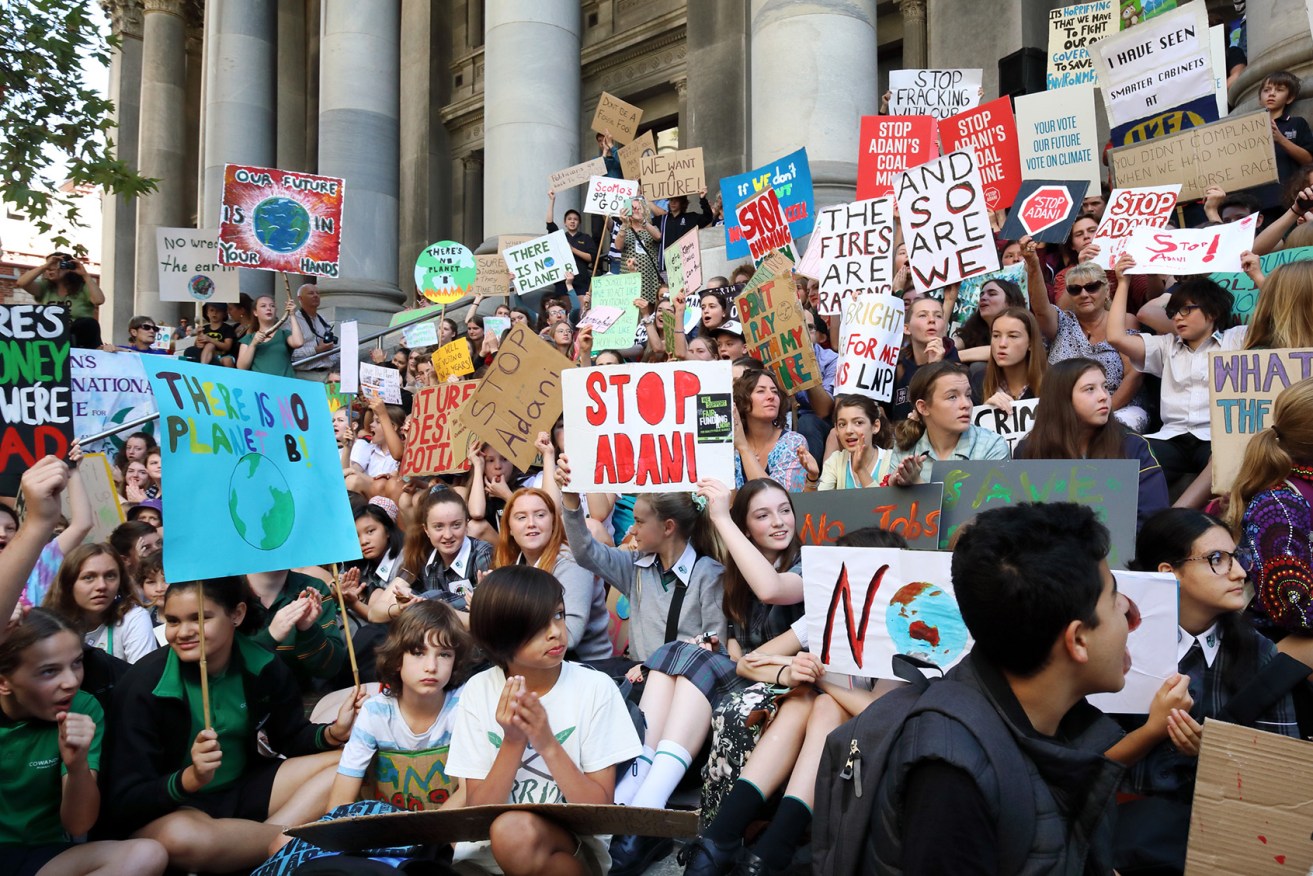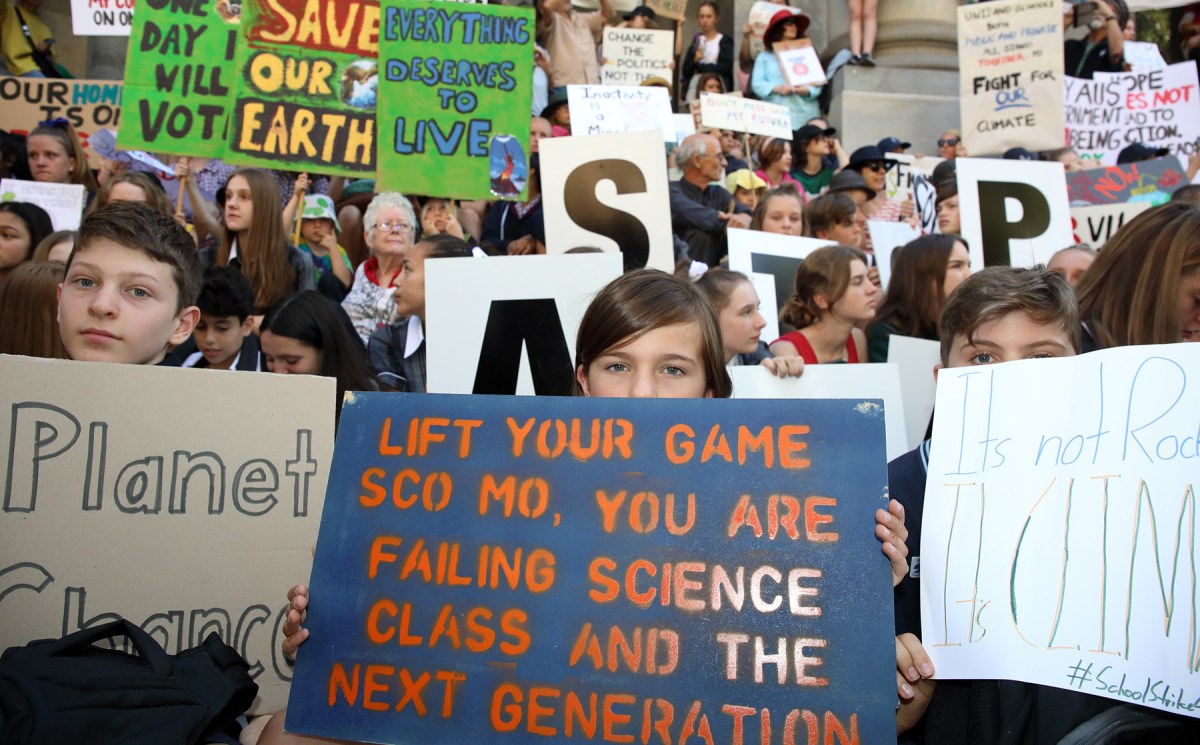School’s out for climate protest
Doha Khan is one of thousands of young South Australians who filled city streets as part of a global school strike protest to demand action on climate change.


In March, students protested at state parliament as part of a global school strike for climate change action. Photo: Tony Lewis/InDaily
The Adelaide School 4 Climate spokesperson is calling for her peers to join her in boycotting school every Friday until the Federal election.
17-year-old Khan says she is committed to protesting on the steps of parliament house once a week. But she wants other young people to stand alongside her.
The call comes as thousands of university and high school students walked out of classrooms throughout South Australia to demand action against climate change.
Inspired by Swedish teenager Greta Thunberg, they joined thousands of other students in demanding politicians take a firmer stance on climate change around the globe.
Meeting at the steps of parliament house, the Adelaide protesters flooded King William street, disrupting traffic.
Among those standing in solidarity was Health Services Union representative Zerebar: “I am standing in support of the students all across the world who are getting organised,” she says.
“We want to show our support for the Indian and Pakistani students, who are also protesting.”
As Zerebar spoke, volunteers passed around petitions to stop drilling in the Great Australian Bight, while students poured from buses holding placards reading “ScoMo likes it hot” and “your profit is our loss”.
When Khan began speaking, the crowd erupted in cheers.

Photo: Tony Lewis/InDaily
Khan says her own involvement in the movement began last year.
“The conversation around the Adani coal mine really inspired me,” she says.
“I could not believe a project of this scale, which poses so many risks and dangers to the environment, still managed to get government approval and support from the LNP. It is essentially selling off our future for a profit.”
She says climate action is more than an environmental issue: “It is a matter of justice and equity.”
“It disproportionately affects Aboriginal and Torres Strait Islander communities. It disproportionately affects underprivileged and under resourced communities overseas.”
She’s also seen the impacts of climate change first hand when her family visited Pakistan last year.
“I met a 12-year-old girl who was working at my aunt’s house, and I was so surprised. I thought, how could a little 12-year-old girl – the same age as my little sister – not be with her with family?
“I spoke with her and she said her family came from a farming background, and that area has been really affected, and the crops aren’t going too well. So she has had to drop out of school and work in someone else’s house.
“It’s these sorts of decisions that more people, more children, are going to have to make in the future. They are going to have to choose between making their family enough money to survive, or set themselves up for a better life to break the cycle of poverty.
“I would hate for Australia to be complicit in forcing children into a situation like that.”
Fellow protester 13-year-old Tom Webster agrees: “We want the government to phase out fossil fuels and commit to no new fossil fuel projects, to stop Adani and bring in 100 per cent renewables by 2030.”
To those critical of the movement, Webster says: “We the children are only 20 per cent of the population, but we are 100 per cent of the future and we are fighting for not only our future, but the future of the human race, and that of the planet.”
Today’s strike follows a string of protests held across Australia in November last year. It was at one of these strikes that year 11 SCU student Jess Timms became involved in the movement: “When you turn on the news every night and there is a new story concerned with climate change, and you are having to navigate and grow up in a world that is so chaotic, you definitely feel like you can’t do anything about it,” she says.
Timms believes the strikes offer hope for a brighter future.
“There is a real problem with the disenfranchisement of youth, and I think that needs to be addressed. I feel like you can get stuck in a dark hole when you don’t think you can make a difference. And that is one of the worst feelings. If by coming to this march we can stop people feeling that way, that would be wonderful.”
While many young people InDaily spoke to believe it’s important to participate in the protests, for Khan and a new generation of activists, the next big fight for climate justice is at the ballot box.
“It was my friend’s (18th) birthday yesterday and I wrote in his card: ‘Don’t forget to vote for the climate xx’.”
Want to comment?
Send us an email, making it clear which story you’re commenting on and including your full name (required for publication) and phone number (only for verification purposes). Please put “Reader views” in the subject.
We’ll publish the best comments in a regular “Reader Views” post. Your comments can be brief, or we can accept up to 350 words, or thereabouts.
InDaily has changed the way we receive comments. Go here for an explanation.




